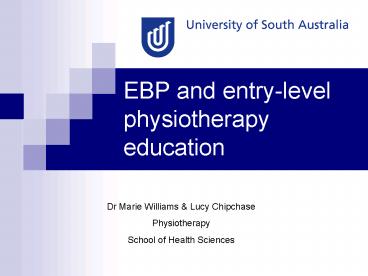EBP and entrylevel physiotherapy education - PowerPoint PPT Presentation
EBP and entrylevel physiotherapy education
Therefore, in theory, educational materials should reflect ... Out-patient. 2. Productivity. Countries where research conducted: Implications and considerations ... – PowerPoint PPT presentation
Title: EBP and entrylevel physiotherapy education
1
EBP and entry-level physiotherapy education
Dr Marie Williams Lucy Chipchase Physiotherapy S
chool of Health Sciences
2
(No Transcript)
3
1. Facilitating learning of EBP
1st year
2nd year
3rd year
4th year
Statistics and Research Methods Topics in
Physio 101
Physiotherapy Clinical Studies 200
Evidence based Research in Physiotherapy
Research Project U
4
2. Evidence Curricular Content
- What levels of evidence underpin curriculum?
- Correct attribution of source material is a
requirement for all writing. Therefore, in
theory, educational materials should reflect the
underlying source and evidence base of the
curricula. - Cardiothoracic physiotherapy benchmark study
- (Williams et al 2004)
- 2004 - 5 Universities involved in reference audit
5
Citations by rank by percentage for each
University
6
Main practical finding
- Highest levels of evidence poorly represented yet
widely available - How would students know what level of evidence
curriculum is based upon? - Explicit inclusion of levels of evidence required
for techniques /interventions
7
Factors perceived to impact on curricula content
(Chipchase et al 2004)
8
3. Evidence educational process
- Systematic review
- Published articles in last 23 years
- Clinical Education and Physiotherapy
- Qualitative and quantitative quality scoring tool
- Only 35 published papers
9
Score gt 7
10
Countries where research conducted
11
Implications and considerations
- Teaching and learning framework
- Research into educational process
12
References
- Chipchase LC, Williams MT, Robertson VJ (2004)
Electrophysical agents curricula in entry level
physiotherapy programs in Australia and New
Zealand. Submitted to Australian Journal of
Physiotherapy - Chipchase L S (2004) Trends in entry level
physiotherapy clinical education a systematic
review. Australian Physiotherapy Association 8th
International Physiotherapy Congress. Adelaide
15-18 May 2004.
PowerShow.com is a leading presentation sharing website. It has millions of presentations already uploaded and available with 1,000s more being uploaded by its users every day. Whatever your area of interest, here you’ll be able to find and view presentations you’ll love and possibly download. And, best of all, it is completely free and easy to use.
You might even have a presentation you’d like to share with others. If so, just upload it to PowerShow.com. We’ll convert it to an HTML5 slideshow that includes all the media types you’ve already added: audio, video, music, pictures, animations and transition effects. Then you can share it with your target audience as well as PowerShow.com’s millions of monthly visitors. And, again, it’s all free.
About the Developers
PowerShow.com is brought to you by CrystalGraphics, the award-winning developer and market-leading publisher of rich-media enhancement products for presentations. Our product offerings include millions of PowerPoint templates, diagrams, animated 3D characters and more.































